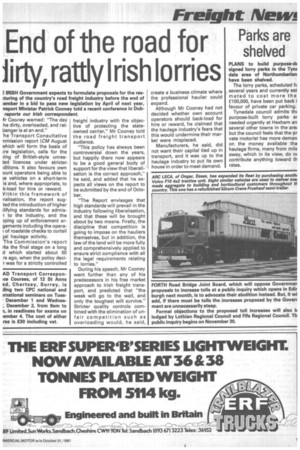End of the road for firty,rattlyirish lorries
Page 9

If you've noticed an error in this article please click here to report it so we can fix it.
E. IRISH Government expects to formulate proposals for the res:turing of the country's road freight industry before the end of :ember in a bid to pass new legislation by April of next year, nsport Minister Patrick Cooney told a recent conference in Dubreports our Irish correspondent.
hr Cooney warned: "The day he dirty, overloaded, and ratbanger is at an end."
he Transport Consultative nmission report (CM August which will form the basis of ire legislation, calls for the iing of British-style unres ted licences under stricter.
qitions. It also favours own ount operators being able to vehicles on a short-term is and, where appropriate, to k-load for hire or reward.
Vithin this framework of .ralisation, the report sug ted the introduction of higher
ilifying standards for admis.1 to the industry, and the
aping up of enforcement argements including the opera1 of roadside checks to curtail lal haulage activity.
The Commission's report rks the final stage on a long d which started about 50 rs ago, when the policy deciI was for a strictly controlled freight industry with the objective of protecting the stateowned carrier," Mr Cooney told the road freight transport audience.
"This policy has always been controversial down the years, but happily there now appears to be a good general body of support for the view that liberalisation is the correct approach," he said, and added that he expects all views on the report to be submitted by the end of October.
"The Report envisages that high standards will prevail in the industry following liberalisation, and that these will be brought about by two means, Firstly, the discipline that competition is going to impose on the hauliers themselves, but in addition, the law of the land will be more fully and comprehensively applied to ensure strict compliance with all the legal requirements relating to lorries."
During his speech, Mr Cooney went further than any of his predecessors in his free market approach to Irish freight transport, and predicted that "the weak will go to the wall, and only the toughest will survive." Stricter quality controls combined with the elimination of unfair competition such as overloading would, he said, create a business climate where the professional haulier could expand.
Although Mr Cooney had not decided whether own account operators should back-load for hire or reward, he claimed that the haulage industry's fears that this would undermine their market were misplaced.
Manufacturers, he said, did not want their capital tied up in transport, and it was up to the haulage industry to put its own house in order to meet demand.










































